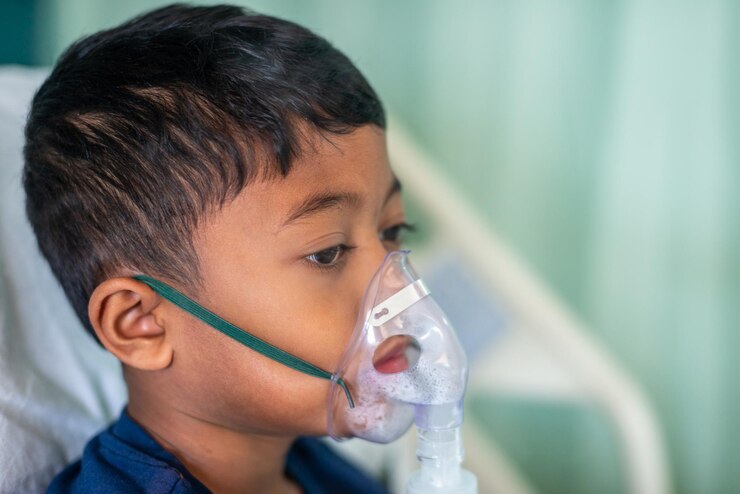Asthma is a common yet chronic respiratory issue in children. In some children, this condition can be managed effectively with proper care and medication. But in some children, the asthma attack will be severe, and they will need to be given immediate medical care.
In some critical cases, children may be admitted to the Pediatric Intensive Care Unit (PICU) for comprehensive monitoring and advanced medical guidance. This blog helps you understand how acute asthma in children can be managed in the PICU.
What Is PICU?
The Pediatric Intensive Care Unit (PICU) is a specialized hospital unit designed to provide intensive medical care for critically ill infants, children, and teenagers. It is equipped with advanced monitoring systems and life-support equipment to manage challenging conditions, including severe asthma attacks in kids, pneumonia, sepsis, and traumatic injuries.
In the PICU, a multidisciplinary team of healthcare professionals, including pediatric intensivists, respiratory therapists, nurses, and pediatric pulmonologists, works together to provide round-the-clock care. The goal is not only to stabilize the child’s condition but also to prevent further complications and support a safe recovery.
What Are The Symptoms Of Asthma Attacks In Children?
Asthma attacks occur when the airways become inflamed and narrowed, making it difficult for air to move in and out of the lungs. The severity of symptoms can vary from mild wheezing to life-threatening breathing difficulties. Recognizing the signs early is crucial in preventing escalation.
Common symptoms of asthma attacks in children include:
- Continuous coughing, particularly in the nighttime or in the morning.
- Wheezing, a whistling sound during breathing, is another common symptom of asthma attacks in children.
- The patient experiences shortness of breath or rapid breathing.
- Chest tightness or pain.
- Breathlessness can cause fatigue or difficulty in speaking.
- Flared nostrils and use of chest or neck muscles to breathe.
- Bluish lips or fingernails indicate low oxygen levels, which require emergency asthma care.
If these symptoms do not improve after using a rescue inhaler, immediate medical help should be sought.
What Are The Common Causes Of Asthma Attacks In Children?
Several factors can trigger asthma attacks, and understanding these helps in both prevention and management. The most common causes include:
- Allergens like pet dander, dust mites, mold, and pollen.
- Respiratory infections, especially viral illnesses like the flu or cold.
- Environmental irritants such as smoke, strong perfumes, or air pollution.
- Activity-induced bronchoconstriction, when physical activity provokes narrowing in the airways.
- Cold air or weather changes.
- Emotional stress or anxiety can worsen breathing difficulty.
Sometimes, missed doses of maintenance medication or using an improper inhaler can also trigger pediatric asthma attacks.
Can Asthma Attacks Be Managed In The PICU?
Yes. When a child experiences a severe or challenging asthma attack, PICU treatment in Coimbatore is often necessary. Here, specialized treatment and constant monitoring ensure that the child receives the best possible care and recovers safely.
Management in the PICU typically involves the following steps:
1. Continuous Monitoring
Vital signs such as heart rate, oxygen saturation, respiratory rate, and blood pressure are closely tracked. This helps the medical team detect even minor changes and respond immediately.
2. Oxygen Therapy
Supplemental oxygen is provided to maintain adequate oxygen levels in the blood. In more critical situations, mechanical ventilation or non-invasive ventilation (BiPAP/CPAP) may be required to support breathing.
3. Airway Support and Relaxation Techniques
Treatments to help open up the airways and reduce constriction are administered under close supervision to ease breathing difficulties.
4. Anti-Inflammatory Therapy
Intravenous or oral treatments are given to reduce airway inflammation and swelling. These help prevent further tightening of the airways.
5. Intravenous Fluids and Supportive Care
IV fluids help maintain hydration, especially if the child is too weak to eat or drink. Other supportive measures may be provided to ensure proper recovery.
6. Identifying Triggers
Doctors assess possible triggers, such as infection or allergen exposure, to prevent recurrence.
7. Transition To Recovery
Once the child’s condition stabilizes, the care team gradually reduces medications and monitors tolerance. Education is provided to parents about inhaler techniques, trigger avoidance, and when to seek medical help.
Conclusion
Severe asthma attacks in children can be frightening, but with the right medical care from the best child hospital in Coimbatore, most children recover fully. The PICU plays a vital role in managing these critical episodes, providing specialized monitoring and treatment that can be life-saving. Parents should always keep emergency medication accessible and ensure their child’s asthma action plan is followed carefully.
Timely recognition of symptoms, preventive care, and regular follow-ups with a pediatric specialist can significantly reduce the risk of severe attacks and ensure a healthy, active life for your child.


